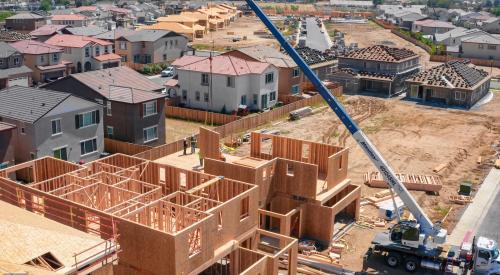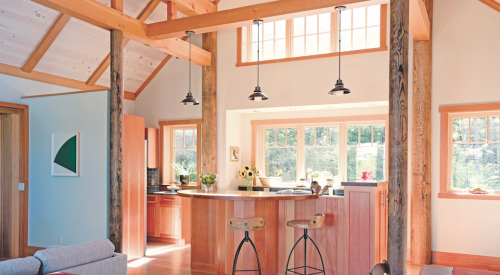Off-site construction has long been a great untapped opportunity for the smaller home builder who starts 25 or fewer units annually. But while the majority of independent operators have been slow to part ways with their traditional on-site practices, an increasing number of builders and developers are enjoying the benefits of off-site construction. These benefits include:
ceramic tile
These and other benefits can help level the competitive playing field for the smaller operator, according to Mick Barker, president of Genesis Homes, the first nationwide constructor of off-site homes, with close to 3,000 single-family and multifamily starts this year. “Collectively, smaller builders are responsible for roughly three-fourths of the single-family homes built every year,” he says. “Yet individually, they operate at a distinct disadvantage versus the giant production companies, with their larger human and financial resources. Genesis Homes’ mission is to give small and medium-size builders and developers the tools they need to compete against their larger competitors.” The advantages of Genesis’ off-site construction concept for the smaller builder are particularly telling when it comes to labor. Any builder, large or small, typically works with more than 30 subcontractors to finish an on-site home. With off-site construction, Genesis effectively minimizes the use of subcontractors, providing most of the skilled labor day after dependable day, with no delays because of missing subs. Come Inside and See Why Despite these powerful attractions, off-site construction remains foreign to most builders. They’ve never tried it, so they haven’t experienced any of the benefits. They also wonder if the concept will even work in their market or appeal to their customer base. Could an off-site home, for example, meet all local codes? Would the choice in models be limited to two or three cookie-cutter floor plans? “We are rapidly overcoming the old image problem along with all the other misgivings builders have long held about our homes,” says Walter R. Young, chairman, president and CEO of Champion Enterprises Inc., the Auburn Hills, Mich.-based parent company of Genesis Homes. “Builders are understandably slow to change because of the considerable risks inherent in their businesses,” Young continues. “But if we have the opportunity to show them the final product — to get them inside one of our homes, so they can see up close the distinctiveness of our designs and the quality of our workmanship — it’s amazing how quickly their resistance to off-site construction fades.” Surging Sales, Growing Popularity Established in June 2000, Genesis expects to generate more than $150 million in revenue for 2001. Its projected unit volume for the year, 3,000 homes, would represent a 50% increase over its output in 2000. Management is targeting an annual production rate of 10,000 homes by 2004. “Genesis Homes is a strong growth platform for our company,” says Phil Surles, chief operating officer for Champion Enterprises. “This growth would take Genesis’ share of our total revenue to better than 25%.” The number of active accounts is rising as well, culled from a list of more than 1,600 prospects. “We target not only smaller builders, but also smaller developers who are highly skilled at doing the ’dirt work’ but who have never wanted to take on the hassles and risks of home construction,” says Byron Stroud, Genesis vice president of sales and marketing for the Eastern region. “But when these excavators realize that Genesis will handle all the construction from the sill plate up, they’re quite happy to let us put them in the home building business.” Roughly 400 independent builders have partnered with Genesis to date. That number continues to grow as builders recognize not only the quality of Genesis construction but also the powerful impact that building a home in a highly controlled factory environment has on their costs and bottom lines. “Our manufacturing efficiencies should enable the builder to cut his cost per square foot between 10% and 15%,” says Barker, adding that the typical cycle time for a Genesis-built home is 90 days, versus the typical six to eight months for a conventional, site-built home. What’s more, during that cycle, Genesis bears construction and building material costs. “Until the home arrives on the site, 90% finished, the builder has no upfront construction costs other than a small deposit,” Barker says. “All he has to do is develop the site, build the foundation and, after the home is set, construct the attachments.” Dedicated to the Builder Why has the Genesis concept enjoyed such a warm reception so soon? Part of the reason is timing: The shortage of skilled labor has grown into a full-blown crisis during the past five years. “Many of the subcontractors the small builder has relied upon for years are retiring from the business,” Stroud says, “leaving a tremendous void in trade skills. The production builder can usually pick up the slack from within its own ranks, but the smaller builder is really hurting.” The latter is also at a disadvantage in two other critical areas: purchasing power and the new techniques of reaching prospective buyers through the Internet. Champion management saw enormous opportunity in helping smaller builders overcome these competitive obstacles. But Champion soon learned that the task could not be accomplished through its already established sales organization, which serves the retail channel. “Our historical way of doing business is geared to a much shorter selling cycle,” Surles says. “We needed a new and completely separate vehicle that could accommodate the builder’s longer land-development process while meeting the specific needs of his local market and customer base.” That new and separate vehicle was Genesis Homes. To launch and operate this new venture,“we recruited the very best sales, marketing, design and engineering talent in the industry — not just from within the Champion organization, but from throughout the modular housing field,” Young says. Barker and his team have built a completely new infrastructure that is 100% dedicated to serving the builder and developer on several critical fronts: Manufacturing: Twelve of Champion’s 49 construction facilities nationwide have been converting their equipment, systems and people to build Genesis product. Located in 10 states across the country, each facility is at a different point in the conversion process, Surles reports. “Right now, I’d say the 12 are 30% converted overall, with some plants at 80% and others at 25%. By 2003, at least nine of them will be producing Genesis product exclusively.” Outside sales: Each construction facility has up to four personnel who spend all their time interacting directly with builder/developer prospects, probing their goals and needs. Who is the targeted customer? What type of home is preferred? What are the price points? “This front-end, exploratory work is vital,” Stroud says, “because this is where we build the foundation for a truly productive relationship. The process can go relatively quickly if the prospect is a scatter-site, single-family builder whose sites are approved and zoned appropriately. On the other hand, a multifamily project will likely take longer.” Either way, Genesis’ outside sales team comes away from the process with an in-depth, detailed grasp of the builder’s needs. Inside support: This group quickly translates the findings of its outside counterparts into the right style of housing at the right price point. “These two elements must be determined rather quickly,” says Stroud, “so we can demonstrate to the prospect how we can enhance his entire construction process.” Design and engineering: Genesis prides itself on the wide variety of attractive designs it offers. Combined, the 12 Genesis construction facilities can build to more than 200 single- family floor plans. Created by professional architects, these preset plans can be modified, for a modest re-engineering fee, to meet client specifications and local code requirements. “Each of our facilities is attuned to the needs and tastes of the region it serves,” Stroud says, “so we will build to whatever code prevails in a locale.” What Makes a Genesis Builder? The new Genesis Homes brand has struck a responsive chord with industry builders. Barker cites not only the company’s rapidly growing unit and dollar volumes, but also the strong response from those who toured the Genesis Show Home at the 2001 International Builders’ Show last February. Genesis came away from Atlanta “with at least 2,000 prospects,” says Barker. “We had people waiting in line up to an hour all four days of the show. Four local television stations and HGTV did on-site specials with the home so that it became a destination point at the show.” Barker anticipates a similarly strong reaction to the 2002 Show Home, which will target the baby boomer buyer with an even bigger, more ambitious upscale design. But as was the case at the 2001 Builders’ Show, the primary target will remain smaller builders who are looking to overcome the limitations of size. “Our ideal client is a financially stable, well-established builder with an excellent reputation in his community,” Barker says. “He is an extremely capable property manager and land developer who can also offer consumers a high level of customer service once the home is set in place. “If a builder can bring all those qualities to the table, plus up to 25 starts a year, we can probably help him double his annual output in a relatively short amount of time. All this off-site construction concept needs is good local partners. Together, Genesis and the small builder can be a very successful team.”












